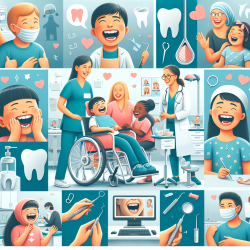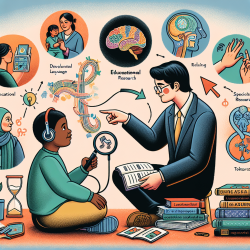Introduction
Oral health is a critical component of overall well-being, yet it is often overlooked, especially in children with disabilities. A recent study titled "Influence of full mouth rehabilitation on oral health-related quality of life among disabled children" sheds light on the transformative impact of full mouth rehabilitation (FMR) on the oral health and quality of life of disabled children. This blog explores the study's findings and offers insights for practitioners aiming to enhance their skills and improve outcomes for this vulnerable population.
The Study at a Glance
Conducted in Saudi Arabia, this prospective study evaluated the efficacy of FMR on the oral health-related quality of life (OHRQoL) of 186 physically disabled children aged 11-14 years. Participants were divided into a test group, which received FMR, and a control group, which did not. Over six months, both groups were assessed using the Child Perceptions Questionnaire and other tools to gauge improvements in oral symptoms, functional limitations, emotional well-being, and social well-being.
Key Findings
- Significant Improvement in Oral Symptoms: The test group exhibited marked improvements in oral symptoms compared to the control group, highlighting the effectiveness of FMR in addressing oral health issues.
- Enhanced Functional and Emotional Well-being: Children in the test group showed significant enhancements in functional limitations and emotional well-being, underscoring the holistic benefits of FMR.
- Positive Social Outcomes: The study also noted improvements in social well-being, indicating that better oral health can lead to increased confidence and social interactions.
Implications for Practitioners
The study's findings underscore the importance of integrating comprehensive dental care into the treatment plans for disabled children. Practitioners can enhance their skills by:
- Emphasizing Preventive Care: Encourage regular dental check-ups and preventive measures to maintain oral health and prevent complications.
- Adopting a Multidisciplinary Approach: Collaborate with other healthcare professionals to address the diverse needs of disabled children and provide holistic care.
- Advocating for Accessibility: Work towards making dental care more accessible for disabled children by addressing barriers such as transportation and financial constraints.
Encouraging Further Research
While this study provides valuable insights, further research is needed to explore the long-term effects of FMR on disabled children's quality of life. Practitioners are encouraged to engage in research initiatives and contribute to the growing body of knowledge in this field.
Conclusion
Full mouth rehabilitation has proven to be a powerful tool in enhancing the oral health and overall quality of life for disabled children. By implementing the study's findings and continuing to explore innovative approaches, practitioners can make a significant difference in the lives of these children. To read the original research paper, please follow this link.










